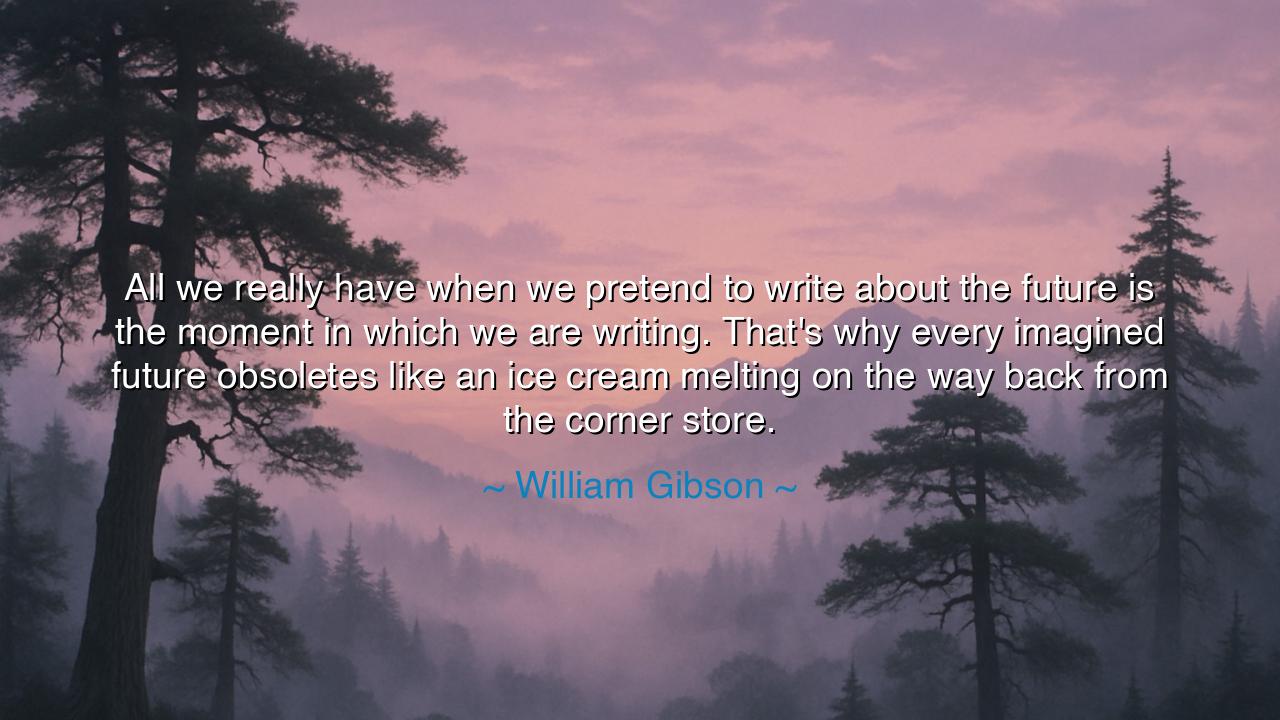
All we really have when we pretend to write about the future is
All we really have when we pretend to write about the future is the moment in which we are writing. That's why every imagined future obsoletes like an ice cream melting on the way back from the corner store.






"All we really have when we pretend to write about the future is the moment in which we are writing. That's why every imagined future obsoletes like an ice cream melting on the way back from the corner store." In these words, William Gibson strikes at the heart of the human condition: our tendency to fixate on what is to come, yet the realization that the future remains just beyond our grasp, always slipping away as time continues to move forward. Gibson acknowledges that when we try to predict the future, we are really just reflecting the present moment, with all its limitations, uncertainties, and fleeting qualities. The future we imagine today becomes obsolete tomorrow, just as an ice cream melts in the warmth of the sun, unceremoniously fading away before we can fully savor it.
The ancients understood well the elusive nature of time, and they, too, grappled with the idea that what we imagine today may not hold true tomorrow. Heraclitus, the Greek philosopher, spoke of the world as one in constant flux, stating that "you cannot step into the same river twice." His words remind us that both time and human experience are always in motion. To think we can capture the future in a moment’s gaze is to overlook the dynamic, ever-changing flow of life itself. The ancients, despite their wisdom, did not predict the future with certainty; they understood that to do so would be an exercise in folly. The future is not something that can be boxed or defined, but rather something that unfurls as we live each day.
Gibson’s comparison of the future to an ice cream melting serves as a powerful image of the fleeting nature of human foresight. We may make our best efforts to forecast what is to come, but just like the ice cream, our predictions are shaped by the heat of the present moment, subject to the forces of change and circumstance. The warmth of the day — the present moment — changes everything. Consider the great oracles of antiquity, like the Oracle of Delphi. Her prophecies, though spoken with authority, were often cryptic and open to interpretation, acknowledging the ambiguity of the future. Even those who sought clarity could only grasp the shadow of what was to come, understanding that the future is never fully revealed.
History is rich with examples of futures imagined and later obsoleted. Take, for example, the Industrial Revolution. The visionaries of that time imagined a world powered by steam and industry, one of unparalleled growth and progress. Yet, the very systems they set in motion gave rise to challenges and disparities that they could not have predicted. The future they imagined was shaped by the present concerns of their time, yet it evolved into something vastly different. Their vision was valid within the context of their moment, but as new realities emerged, so too did new understandings of what the future could be.
The lesson of Gibson’s quote, then, is to recognize the ephemeral nature of both the present and our projections about the future. We must understand that no matter how well we may plan, no matter how carefully we craft our ideas about what is to come, the future is like an ice cream that melts away, shifting in response to new ideas, circumstances, and understandings. It is the moment in which we live that shapes the future, and the present is all we truly control. The more we cling to an imagined future, the more we risk missing the richness of the life we are living right now.
What then is the call to action for us? To embrace the present moment, to fully live in the now, and to shape the future through our actions today. Instead of building grand visions of what is to come, we must focus on what we can do today—on the choices we make and the small steps we take. By living authentically and with purpose in the present, we unknowingly create the foundation for a future that is meaningful and true, rather than one shaped by empty predictions.
In our own lives, let us practice awareness of the present moment, recognizing that it is only in this fleeting now that we can act, grow, and influence the world. Like the ancients, who valued wisdom not in predicting the future, but in living virtuously today, we must turn our attention to what we can do in the here and now. We cannot hold the future in our hands, but by living with intentionality today, we shape the course of tomorrow. Let us not waste our energy on forecasts and imaginings, but focus on the power of the moment we have, knowing that the future will unfold as it must, shaped by the choices we make today.






AAdministratorAdministrator
Welcome, honored guests. Please leave a comment, we will respond soon